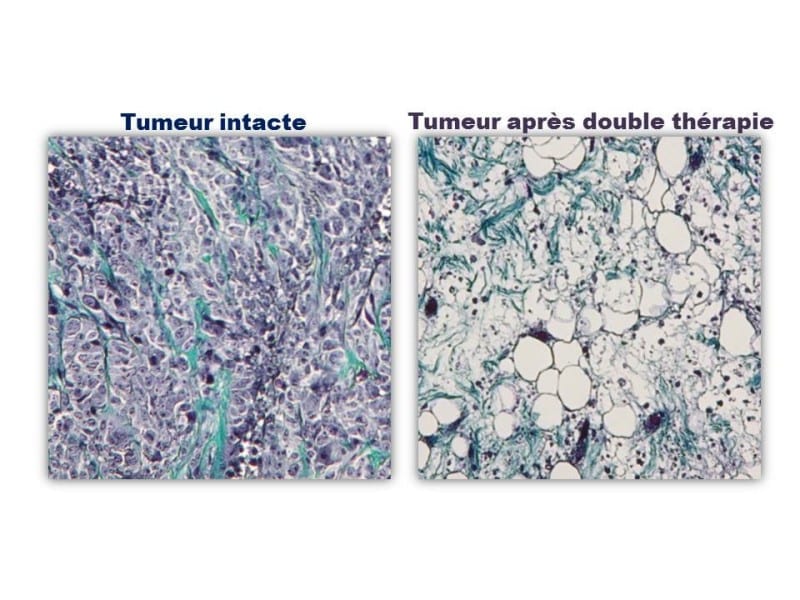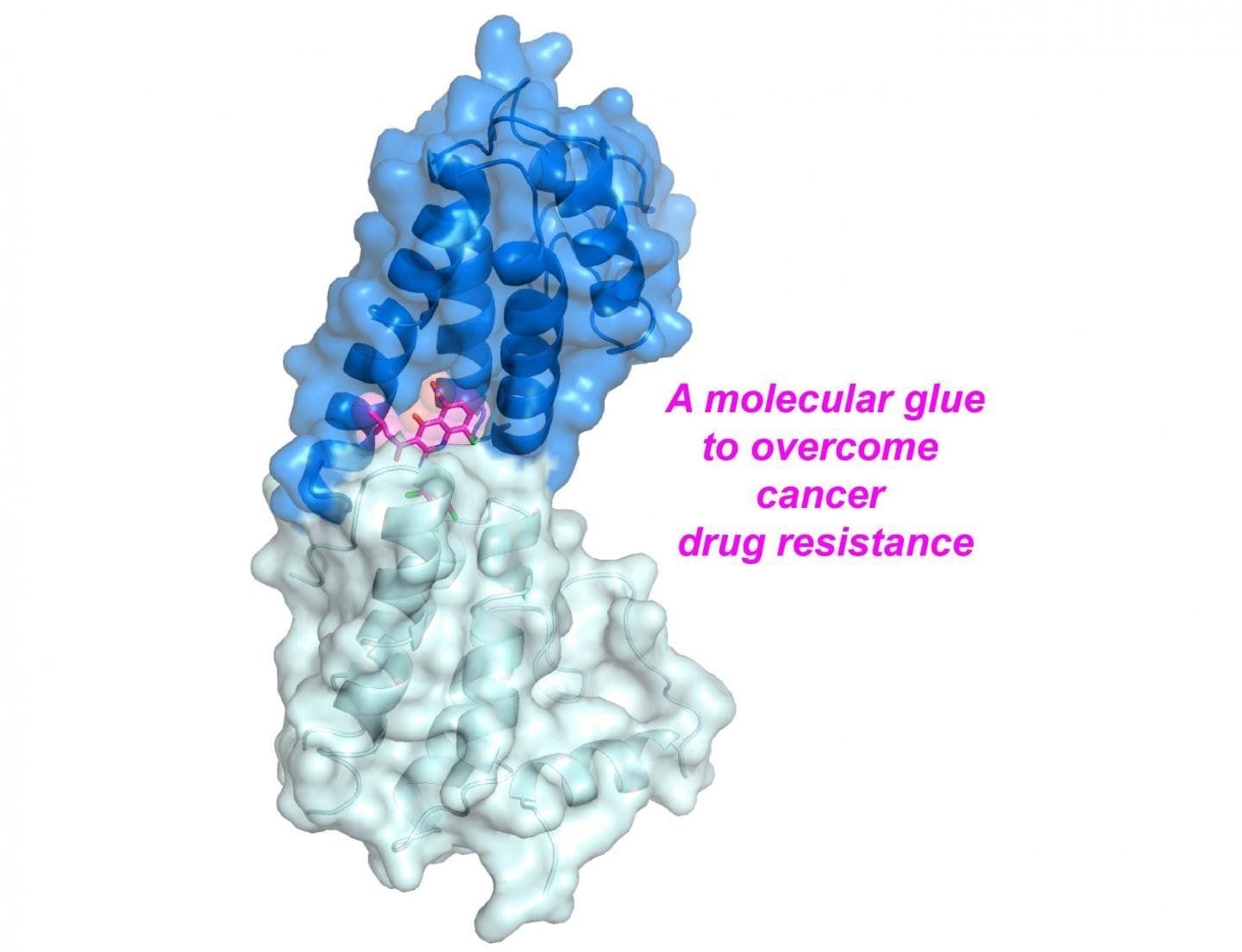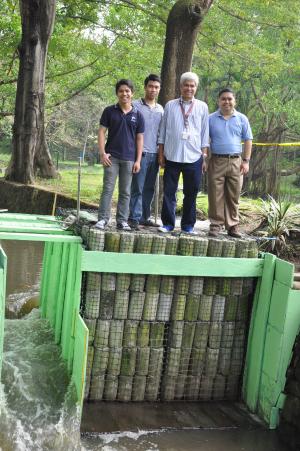
Credit: Riccardo Di Corato – laboratoire MSC (CNRS/Université Paris Diderot)
By combining, in a liposome, magnetic nanoparticles and photosensitizers that are simultaneously and remotely activated by external physical stimuli (a magnetic field and light), scientists obtained total tumor regression in mice.
Non-toxic when they are not activated, such therapies can also achieve a reduction in adverse effects. These results demonstrate the importance of multiple treatments.
One of the strategies employed to limit the adverse effects of cancer therapies is the development of nanocarrier systems that can convey active ingredients to target tumor cells. These are referred to as “physical” therapies when the active substances, molecules or nanoparticles, can be remotely activated by external physical stimuli — in this case by light or a magnetic field. In this context, the study team developed a new type of carrier that combines photosensitivity and magnetism. To achieve this, they first encapsulated magnetic nanoparticles in the inner compartment of a liposome in sufficient quantities to render it ultra-magnetic, before incorporating photosensitizers into its lipid bilayer, while preserving an optimum size for circulation in the blood.
These liposomes, containing magnetic nanoparticles and photosensitizers, were injected directly into the tumor in the mouse model. The scientists thus combined two techniques to achieve complete destruction of cancer cells. The first one, magnetic hyperthermia, consists in exciting the nanoparticles with a magnetic field to raise the temperature of the tumor and destroy it.. The second method, photodynamic therapy, is made possible by the photosensitizers, which, when activated, release reactive oxygen species that are toxic to tumor cells. These two physical therapies act in synergy on the activity of the proteins involved in apoptosis, or programmed cell death. Their combination thus induces total regression of the tumor, while a single therapy is not able to stop its growth.
Read more: Combining magnetism and light to fight cancer
The Latest on: Tumor regression
[google_news title=”” keyword=”Tumor regression” num_posts=”10″ blurb_length=”0″ show_thumb=”left”]
via Google News
The Latest on: Tumor regression
- APCCC 2024: Cardiovascular Complications in Advanced Prostate Cancer – How to Prevent Them and How to Monitor Patients?on April 27, 2024 at 7:58 am
Advanced Prostate Cancer Consensus Conference (APCCC) meeting featured a session on the identification, assessment, and management of side effects of systemic therapies, and a presentation by Dr.
- Dr. Loh: How do you know a new treatment is better?on April 27, 2024 at 7:32 am
The FDA and EMA are now encouraging what my patients and colleagues have heard me refer to as the “so what?” trials.
- Breast cancer survivors have increased rate of mesh exposure complications from tension-free vaginal tape surgery: Studyon April 26, 2024 at 7:15 am
USA: A recent study published in Urogynecology reported a higher rate of mesh exposure complications from tension-free vaginal tape (TVT) surgery in women with breast cancer compared with women ...
- Immunotherapy Safely Boosted with Particle-Bound Cytokines in Tumor Modelson April 21, 2024 at 10:00 am
Used in combination with immune checkpoint therapy, cytokine molecules “step on the gas” to jump-start the immune system’s anticancer response.
- Cancer Breakthrough Found to Boost Immune Cells Without Harmful Side-Effects By Directing Protein Cytokineson April 21, 2024 at 7:00 am
A new way to safely boost immune cells to fight cancer—avoiding harmful side-effects such as hair loss—has been developed.
- Cancer Stage vs Mortality Endpoints in Screening Trials: What's Best?on April 18, 2024 at 5:04 am
In clinical trials of cancer screening, the incidence of late-stage cancer works as well as cancer-specific mortality as an endpoint for some cancers but not others.
- Study Uncovers Potential Immunotherapy Approach for Rare Eye Canceron April 18, 2024 at 2:15 am
New research explains why metastatic uveal melanoma is resistant to conventional immunotherapies and how adoptive therapy can successfully treat this rare and aggressive cancer.
- TIL Therapy Promising in Uveal Melanoma, Tool Predicts Responderson April 17, 2024 at 8:00 am
A type of therapy that involves “liberating” T cells from a suppressive tumor environment showed promise in the treatment of patients with uveal melanoma.
- New insights could unlock immunotherapy for rare, deadly eye canceron April 16, 2024 at 10:54 am
New research from the University of Pittsburgh explains why metastatic uveal melanoma is resistant to conventional immunotherapies and how adoptive therapy, which involves growing a patient’s T cells ...
- Clinical tool predicts adoptive therapy response in eye cancer patientson April 16, 2024 at 6:00 am
New predictive tool sheds light on immunotherapy-resistant metastatic uveal melanoma and how adoptive therapy can successfully be used to treat the cancer.
via Bing News










